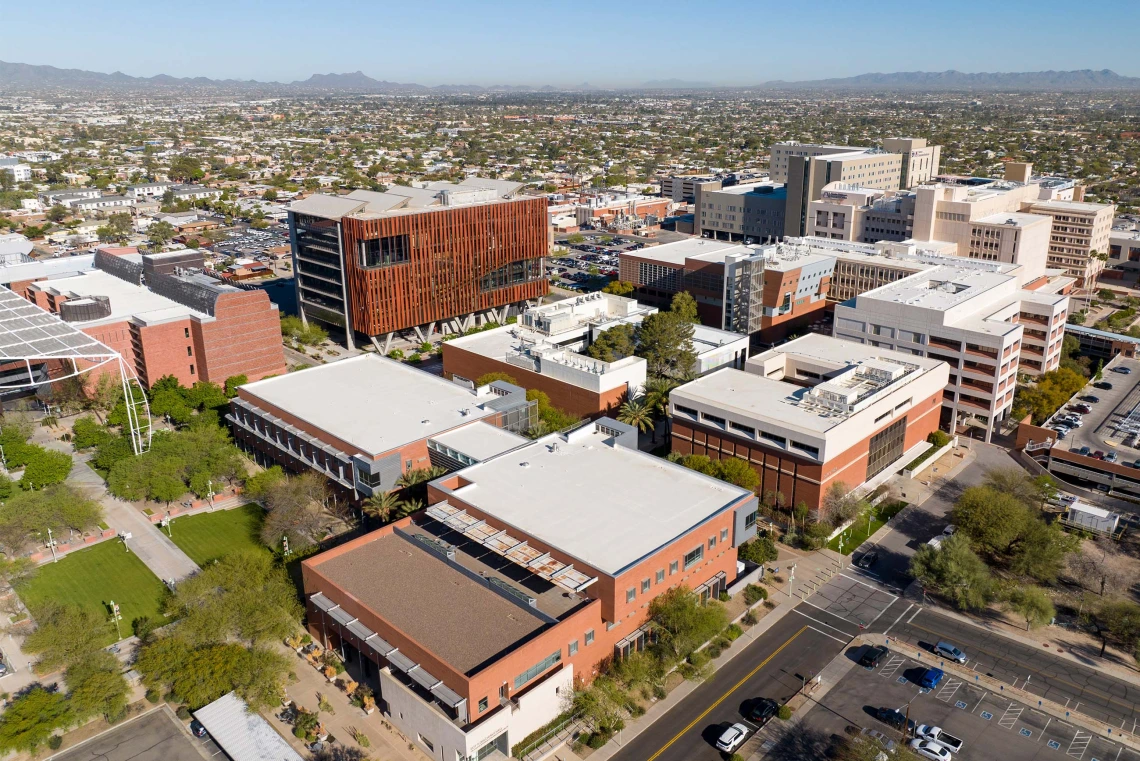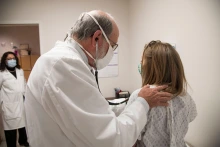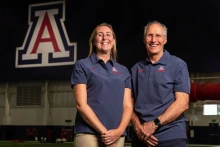A decade of impact: the U of A/Banner academic medicine partnership
The University of Arizona and Banner Health are turning innovation into impact to improve lives across Arizona and beyond.

Photo by U of A Health Sciences
Over the past 10 years, the University of Arizona and Banner Health have united to transform health care in Arizona and beyond. The cutting-edge research, lifesaving clinical trials, facility expansions and innovative educational programs reflect the mission of academic medicine: improving health and well-being through education, research and patient care. Below are some of the most significant milestones from the past decade, each a testament to the power of partnership, purpose and progress.
All of Us: advancing precision medicine

The U of A and Banner Health were awarded a $60 million grant from the National Institutes of Health’s All of Us Research Program. This historic effort to collect and study data from 1 million or more people living in the U.S. will accelerate health research and medical breakthroughs, enabling individualized prevention, treatment and care for all of us. The program has enrolled more than 88,000 participants – more than any other site in the country – helping ensure diverse populations are represented in the future of precision medicine.
Better bone marrow transplants for cancer

Novel therapies developed at the University of Arizona Cancer Center are making bone marrow transplants more accessible with haplo-BMT, a type of transplant that allows for donated marrow to only half-match the patient as opposed to the near-perfect protein match required before. This next-generation cancer therapy has been critically important in improving survivability for patients who lack a perfect match. The most commonly used protocols begin with chemotherapy, followed by the transplant from the half-matched donor. After the transplant, a patient is given more chemotherapy. Researchers are working to further reduce side effects while boosting immune response.
100 heart transplants and counting

In 2023, Banner – University Medical Center Phoenix’s Advanced Heart Failure Program marked its 100th heart transplant at the state’s only comprehensive heart failure center. Led by University of Arizona College of Medicine – Phoenix faculty physicians Dr. Francisco Arabia and Dr. Radha Gopalan, the program reached this milestone just three years after its launch. This is the only program in the state implanting both left ventricular assist devices and total artificial hearts, and has the highest survival rate in the world for patients receiving an artificial heart in 2022 and 2023.
Shining a green light on migraine

Migraine can also be difficult for physicians to treat, but a new treatment that uses green light exposure is offering people who suffer from migraine new hope. College of Medicine – Tucson and Comprehensive Center for Pain and Addiction researchers led a clinical trial that found green light exposure reduced the number of headache days per month, along with an approximately 60% reduction in pain, shorter duration of headaches, and improved ability to fall and stay asleep, perform chores, exercise and work.
Immunotherapy gives the gift of time

Silver Darmer gained years of family time thanks to a clinical trial at the U of A Cancer Center that paired immunotherapy with targeted chemotherapy for patients with metastatic pancreatic cancer. The idea was based on preclinical research conducted at the College of Medicine – Tucson that involved growing organoid models of pancreatic cancer tumors derived from patient samples. The preclinical research and clinical trial are two of many examples that reflects the life-changing potential of cutting-edge cancer treatments being developed at the University of Arizona.
Pointing personalized medicine at Parkinson’s

A physician-scientist at the U of A College of Medicine – Tucson is pioneering new methods of cell transplantation involving brain cells made from a patient’s own skin cells. In 2024, the first transplant was performed in a person with Parkinson’s disease by combining advances in cell transplantation with surgical techniques developed from image-guided deep brain stimulation and real-time MRI. The clinical trial, sponsored by Aspen Neuroscience, capitalized on the unique strengths of academic medicine.
Fighting Valley fever with faster diagnoses

The U of A College of Medicine – Tucson’s Valley Fever Center for Excellence and Banner Health teamed up to help providers diagnose Valley fever more quickly and accurately, reducing delays, preventing misdiagnosis and improving outcomes for patients in the Southwest. The Valley fever clinical practice guide is an agreed-upon set of rules for when primary care, urgent care and emergency department doctors should do tests needed to detect Valley fever earlier. The guidelines are available to clinicians throughout Arizona and beyond.
Athletes benefit from academic medicine

A collaboration with Arizona Athletics developed a comprehensive care program focused on healthy living, injury prevention, diagnosis, treatment and rehabilitation. The model, which was built to expand to student-athletes and athletes of all ages across Southern Arizona, creates programs of distinction in clinical care, research and workforce training programs in key disciplines essential to sports medicine. The program brings life to the shared vision of providing world-class care for athletes in an academic medical setting.
Transforming the health care landscape
Over the past decade, the U of A and Banner – University Medicine have made bold investments in facilities that are changing the face of health care in Southern Arizona. The opening of the new patient tower at Banner – UMC Tucson, the development of the University of Arizona Cancer Center’s North Campus, and the arrival of the Banner Alzheimer’s Institute in Tucson all reflect a deep commitment to world-class care, clinical research and community health.
Read more:
New Patient Tower at Banner – UMC Tucson
U of A Cancer Center North Campus
Banner Alzheimer’s Institute Comes to Tucson
Fellowship empowers physicians to treat chronic pain

A fellowship at the College of Medicine – Tucson’s Department of Anesthesiology and the Banner Chronic Pain Clinic is equipping physicians with the skills and confidence to better treat patients with chronic pain. The yearlong program focuses on evidence-based, non-opioid pain management strategies. The fellows participate in patient care and become skilled in the evaluation and treatment of chronic and cancer pain. Fellows report the program has deepened their knowledge and changed the way they care for patients, with lasting impact on the communities they serve.
Expanding Graduate Medical Education

The University of Arizona College of Medicine – Phoenix and Banner Health partnered to expand their Graduate Medical Education programs with 229 additional residency and fellowship positions. The initiative expanded three programs in 2024 and will build 16 new programs by 2027, growing the number of specialty-trained physicians through the partnership by more than 60%. This unprecedented growth in the future of the health care workforce will help alleviate the severe physician shortage facing Arizona and allow more people to access high-quality health care.
These achievements mark just a few of the extraordinary ways the University of Arizona and Banner Health are shaping the future of health care. Together, we are turning innovation into impact to improve lives across Arizona and beyond. As we look to the next decade, our commitment remains the same: lead, educate, heal and transform the world through academic medicine.
Contact
Blair Willis
U of A Health Sciences Office of Communications
520-419-2979, bmw23@arizona.edu

